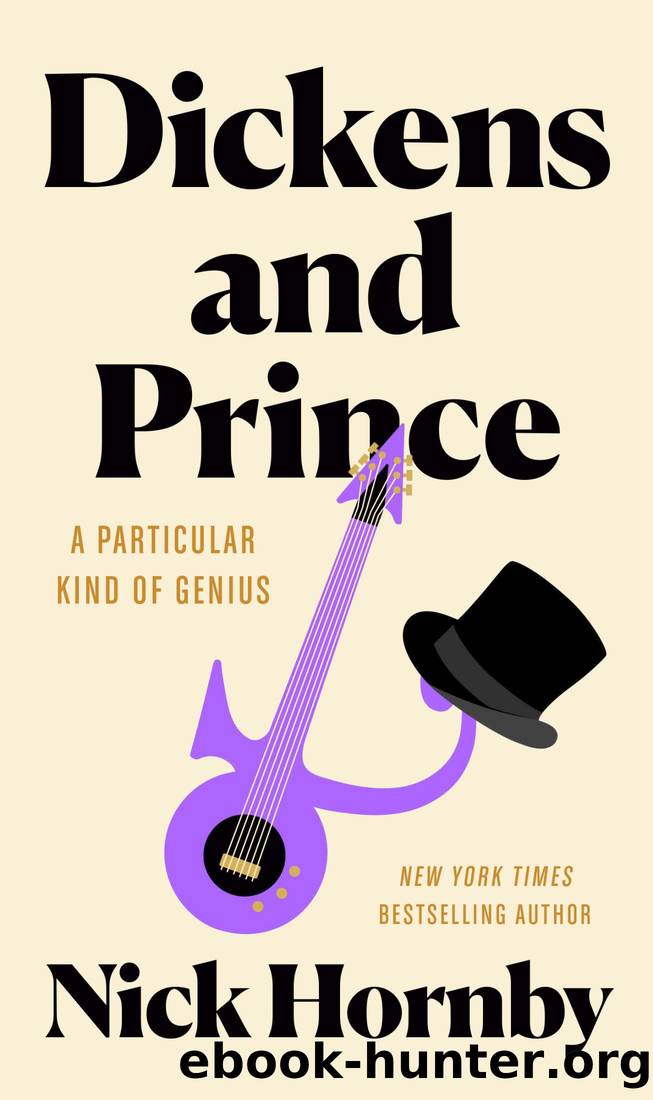Dickens and Prince: A Particular Kind of Genius by Hornby Nick

Author:Hornby, Nick [Hornby, Nick]
Language: eng
Format: epub
Tags: Music, Biography, History, Art
ISBN: 9780593541821
Amazon: 0593541820
Goodreads: 60621165
Publisher: Riverhead Books
Published: 2022-11-15T08:00:00+00:00
* * *
â
He was, it goes without saying, making several different albums at the same time in 1986, when he was recording all those songs on the Sign oâ the Times boxed set. One of them was for a female alter ego he called Camille, whose androgynous voice was created by changing the pitch on his vocalsâthe song âIf I Was Your Girlfriendâ on the original album is perhaps the most notable demonstration of his intention. There was another album called Dream Factory, which, like the Camille album, became folded into the triple album Crystal Ball, which became the original double album Sign oâ the Times. The triple album Crystal Ball, by the way, is not the same as the triple album also entitled Crystal Ball, which came out in 1998 and which comes after the triple album Emancipation in his discography. Thatâs an awful lot of music. The sixteen tracks on the original album donât really cohere into a unified whole, but thatâs the glory of it; even now itâs possible to come across a great song that youâve forgotten about because it somehow doesnât seem to belong. And that way, Prince is given permission to display the full range of his talents. Sign oâ the Times isnât a funk-jam album, or a robotic electro-pop album, or a Jehovahâs Witness album (there was one of those). It was all of these things and more. For me, Sign oâ the Times is right up there with the great double albums, with Blonde on Blonde, Exile on Main St., Songs in the Key of Life, and London Calling, and is probably the only one of even that august group that I would happily listen to from beginning to end right now. It was, after 1999, his second great double album in five years.
Prince was twenty-eight when he was recording Sign oâ the Times. Dickens was working every bit as hard at the same age, but not because he was on fire, like Prince. On the contrary, he was worried that the embers of his creativity were cooling too fast. He had written three big novels and a couple of plays, and was the editor of a monthly magazine. He had a young family and was living beyond his means, and as a result he had gotten into a mess by promising different publishers work he couldnât possibly deliver. In 1840, says Claire Tomalin, âhe intended to enjoy himself in a more leisurely way by editing Master Humphreyâs Clock, the small miscellaneous weekly magazine.â It would be filled by his literary friends, and, he hoped, would pay him £5,000 a year while he recuperated. But after a promising start, sales of Master Humphrey crashed, and as far as he could see, the only way out was to turn a short story he had written into another full-length serialâwhich meant he had to improvise week to week a novel he had not even thought of in January. Iâm sure it would come as
Download
This site does not store any files on its server. We only index and link to content provided by other sites. Please contact the content providers to delete copyright contents if any and email us, we'll remove relevant links or contents immediately.
Wonder by R.J. Palacio(8580)
Mastering Adobe Animate 2023 - Third Edition by Joseph Labrecque(3843)
Unlabel: Selling You Without Selling Out by Marc Ecko(3663)
Ogilvy on Advertising by David Ogilvy(3622)
Hidden Persuasion: 33 psychological influence techniques in advertising by Marc Andrews & Matthijs van Leeuwen & Rick van Baaren(3565)
Drawing Cutting Edge Anatomy by Christopher Hart(3529)
The Pixar Touch by David A. Price(3439)
POP by Steven Heller(3361)
The Code Book by Simon Singh(3189)
The Art of War Visualized by Jessica Hagy(3007)
Slugfest by Reed Tucker(3004)
The Curated Closet by Anuschka Rees(2974)
Rapid Viz: A New Method for the Rapid Visualization of Ideas by Kurt Hanks & Larry Belliston(2906)
Stacked Decks by The Rotenberg Collection(2883)
365 Days of Wonder by R.J. Palacio(2838)
The Wardrobe Wakeup by Lois Joy Johnson(2783)
Keep Going by Austin Kleon(2763)
Tattoo Art by Doralba Picerno(2668)
Tell Me More by Kelly Corrigan(2652)
